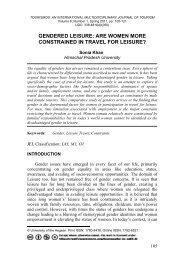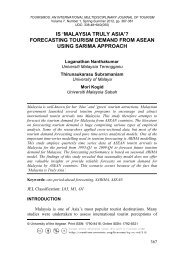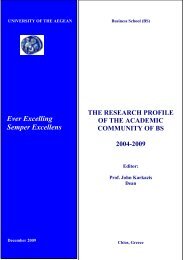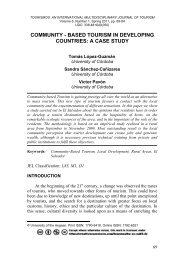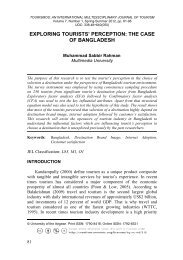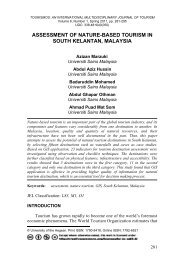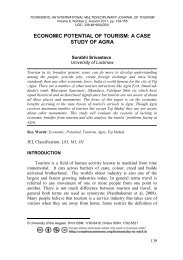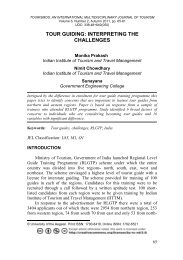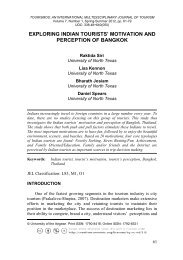- Page 1 and 2: TOURISMOS is an international, mult
- Page 3 and 4: 2 TOURISMOS An International Multid
- Page 5 and 6: Alexis Saveriades, Cyprus Universit
- Page 7 and 8: 6 second home development could hav
- Page 9 and 10: 8 be drawn from literature. Several
- Page 11 and 12: 10 Tourism researchers have begun t
- Page 13 and 14: BOOK REVIEWS: 12 and social facilit
- Page 16 and 17: TOURISMOS: AN INTERNATIONAL MULTIDI
- Page 18 and 19: TOURISMOS: AN INTERNATIONAL MULTIDI
- Page 20 and 21: TOURISMOS: AN INTERNATIONAL MULTIDI
- Page 22 and 23: TOURISMOS: AN INTERNATIONAL MULTIDI
- Page 24 and 25: TOURISMOS: AN INTERNATIONAL MULTIDI
- Page 26 and 27: TOURISMOS: AN INTERNATIONAL MULTIDI
- Page 28 and 29: TOURISMOS: AN INTERNATIONAL MULTIDI
- Page 30: TOURISMOS: AN INTERNATIONAL MULTIDI
- Page 33 and 34: 32 Ali Asgary, Mohammad Reza Rezvan
- Page 35 and 36: 34 Ali Asgary, Mohammad Reza Rezvan
- Page 37 and 38: 36 Ali Asgary, Mohammad Reza Rezvan
- Page 39 and 40: 38 Ali Asgary, Mohammad Reza Rezvan
- Page 41 and 42: 40 Ali Asgary, Mohammad Reza Rezvan
- Page 43 and 44: Ali Asgary, Mohammad Reza Rezvani &
- Page 45: Ali Asgary, Mohammad Reza Rezvani &
- Page 49 and 50: 48 Ali Asgary, Mohammad Reza Rezvan
- Page 51 and 52: 50 Ali Asgary, Mohammad Reza Rezvan
- Page 54 and 55: TOURISMOS: AN INTERNATIONAL MULTIDI
- Page 56 and 57: TOURISMOS: AN INTERNATIONAL MULTIDI
- Page 58 and 59: TOURISMOS: AN INTERNATIONAL MULTIDI
- Page 60 and 61: TOURISMOS: AN INTERNATIONAL MULTIDI
- Page 62 and 63: TOURISMOS: AN INTERNATIONAL MULTIDI
- Page 64 and 65: TOURISMOS: AN INTERNATIONAL MULTIDI
- Page 66 and 67: TOURISMOS: AN INTERNATIONAL MULTIDI
- Page 68 and 69: TOURISMOS: AN INTERNATIONAL MULTIDI
- Page 70 and 71: TOURISMOS: AN INTERNATIONAL MULTIDI
- Page 72 and 73: TOURISMOS: AN INTERNATIONAL MULTIDI
- Page 74 and 75: TOURISMOS: AN INTERNATIONAL MULTIDI
- Page 76 and 77: TOURISMOS: AN INTERNATIONAL MULTIDI
- Page 78 and 79: TOURISMOS: AN INTERNATIONAL MULTIDI
- Page 80 and 81: TOURISMOS: AN INTERNATIONAL MULTIDI
- Page 82 and 83: TOURISMOS: AN INTERNATIONAL MULTIDI
- Page 84 and 85: TOURISMOS: AN INTERNATIONAL MULTIDI
- Page 86 and 87: TOURISMOS: AN INTERNATIONAL MULTIDI
- Page 88 and 89: TOURISMOS: AN INTERNATIONAL MULTIDI
- Page 90 and 91: TOURISMOS: AN INTERNATIONAL MULTIDI
- Page 92 and 93: TOURISMOS: AN INTERNATIONAL MULTIDI
- Page 94 and 95: TOURISMOS: AN INTERNATIONAL MULTIDI
- Page 96 and 97:
TOURISMOS: AN INTERNATIONAL MULTIDI
- Page 98 and 99:
TOURISMOS: AN INTERNATIONAL MULTIDI
- Page 100 and 101:
TOURISMOS: AN INTERNATIONAL MULTIDI
- Page 102 and 103:
TOURISMOS: AN INTERNATIONAL MULTIDI
- Page 104 and 105:
TOURISMOS: AN INTERNATIONAL MULTIDI
- Page 106 and 107:
TOURISMOS: AN INTERNATIONAL MULTIDI
- Page 108 and 109:
TOURISMOS: AN INTERNATIONAL MULTIDI
- Page 110 and 111:
TOURISMOS: AN INTERNATIONAL MULTIDI
- Page 112 and 113:
TOURISMOS: AN INTERNATIONAL MULTIDI
- Page 114 and 115:
TOURISMOS: AN INTERNATIONAL MULTIDI
- Page 116 and 117:
TOURISMOS: AN INTERNATIONAL MULTIDI
- Page 118 and 119:
TOURISMOS: AN INTERNATIONAL MULTIDI
- Page 120 and 121:
TOURISMOS: AN INTERNATIONAL MULTIDI
- Page 122:
TOURISMOS: AN INTERNATIONAL MULTIDI
- Page 125 and 126:
Maria Alebaki & Olga Iakovidou “w
- Page 127 and 128:
Maria Alebaki & Olga Iakovidou Desc
- Page 129 and 130:
Maria Alebaki & Olga Iakovidou 2006
- Page 131 and 132:
Maria Alebaki & Olga Iakovidou the
- Page 133 and 134:
Maria Alebaki & Olga Iakovidou In s
- Page 135 and 136:
Maria Alebaki & Olga Iakovidou It i
- Page 137 and 138:
Maria Alebaki & Olga Iakovidou Blij
- Page 139 and 140:
Maria Alebaki & Olga Iakovidou McDo
- Page 141 and 142:
140 Maria Alebaki & Olga Iakovidou
- Page 143 and 144:
Juan Gabriel Brida, Linda Osti & Es
- Page 145 and 146:
Juan Gabriel Brida, Linda Osti & Es
- Page 147 and 148:
Juan Gabriel Brida, Linda Osti & Es
- Page 149 and 150:
Juan Gabriel Brida, Linda Osti & Es
- Page 151 and 152:
Juan Gabriel Brida, Linda Osti & Es
- Page 153 and 154:
Juan Gabriel Brida, Linda Osti & Es
- Page 155 and 156:
Juan Gabriel Brida, Linda Osti & Es
- Page 157 and 158:
Juan Gabriel Brida, Linda Osti & Es
- Page 159 and 160:
Juan Gabriel Brida, Linda Osti & Es
- Page 161 and 162:
Juan Gabriel Brida, Linda Osti & Es
- Page 163 and 164:
Juan Gabriel Brida, Linda Osti & Es
- Page 166 and 167:
TOURISMOS: AN INTERNATIONAL MULTIDI
- Page 168 and 169:
TOURISMOS: AN INTERNATIONAL MULTIDI
- Page 170 and 171:
TOURISMOS: AN INTERNATIONAL MULTIDI
- Page 172 and 173:
TOURISMOS: AN INTERNATIONAL MULTIDI
- Page 174 and 175:
TOURISMOS: AN INTERNATIONAL MULTIDI
- Page 176 and 177:
TOURISMOS: AN INTERNATIONAL MULTIDI
- Page 178 and 179:
TOURISMOS: AN INTERNATIONAL MULTIDI
- Page 180 and 181:
TOURISMOS: AN INTERNATIONAL MULTIDI
- Page 182 and 183:
TOURISMOS: AN INTERNATIONAL MULTIDI
- Page 184 and 185:
TOURISMOS: AN INTERNATIONAL MULTIDI
- Page 186 and 187:
TOURISMOS: AN INTERNATIONAL MULTIDI
- Page 188 and 189:
TOURISMOS: AN INTERNATIONAL MULTIDI
- Page 190 and 191:
TOURISMOS: AN INTERNATIONAL MULTIDI
- Page 192:
TOURISMOS: AN INTERNATIONAL MULTIDI
- Page 195 and 196:
A. Akın Aksu & Sevcan Yildiz Gener
- Page 197 and 198:
A. Akın Aksu & Sevcan Yildiz level
- Page 199 and 200:
A. Akın Aksu & Sevcan Yildiz Accor
- Page 201 and 202:
A. Akın Aksu & Sevcan Yildiz great
- Page 203 and 204:
DATA FINDINGS A. Akın Aksu & Sevca
- Page 205 and 206:
A. Akın Aksu & Sevcan Yildiz 7. Th
- Page 207 and 208:
A. Akın Aksu & Sevcan Yildiz Table
- Page 209 and 210:
A. Akın Aksu & Sevcan Yildiz *YTL:
- Page 211 and 212:
A. Akın Aksu & Sevcan Yildiz the f
- Page 213 and 214:
212 A. Akın Aksu & Sevcan Yildiz A
- Page 215 and 216:
Filippo Monge & Paolo Brandimarte r
- Page 217 and 218:
Filippo Monge & Paolo Brandimarte s
- Page 219 and 220:
Filippo Monge & Paolo Brandimarte T
- Page 221 and 222:
220 Filippo Monge & Paolo Brandimar
- Page 223 and 224:
Mirjana Kovačić, Zvonko Gržetić
- Page 225 and 226:
Mirjana Kovačić, Zvonko Gržetić
- Page 227 and 228:
Mirjana Kovačić, Zvonko Gržetić
- Page 229 and 230:
Mirjana Kovačić, Zvonko Gržetić
- Page 231 and 232:
Mirjana Kovačić, Zvonko Gržetić
- Page 233 and 234:
232 Mirjana Kovačić, Zvonko Grže
- Page 235 and 236:
Constantina Skanavis & Maria Sakell
- Page 237 and 238:
Constantina Skanavis & Maria Sakell
- Page 239 and 240:
Constantina Skanavis & Maria Sakell
- Page 241 and 242:
Constantina Skanavis & Maria Sakell
- Page 243 and 244:
Constantina Skanavis & Maria Sakell
- Page 245 and 246:
Constantina Skanavis & Maria Sakell
- Page 247 and 248:
Constantina Skanavis & Maria Sakell
- Page 249 and 250:
Constantina Skanavis & Maria Sakell
- Page 252 and 253:
TOURISMOS: AN INTERNATIONAL MULTIDI
- Page 254 and 255:
TOURISMOS: AN INTERNATIONAL MULTIDI
- Page 256 and 257:
TOURISMOS: AN INTERNATIONAL MULTIDI
- Page 258 and 259:
TOURISMOS: AN INTERNATIONAL MULTIDI
- Page 260 and 261:
TOURISMOS: AN INTERNATIONAL MULTIDI
- Page 262 and 263:
TOURISMOS: AN INTERNATIONAL MULTIDI
- Page 264 and 265:
TOURISMOS: AN INTERNATIONAL MULTIDI
- Page 266 and 267:
TOURISMOS: AN INTERNATIONAL MULTIDI
- Page 268 and 269:
TOURISMOS: AN INTERNATIONAL MULTIDI
- Page 270 and 271:
TOURISMOS: AN INTERNATIONAL MULTIDI
- Page 272 and 273:
TOURISMOS: AN INTERNATIONAL MULTIDI
- Page 274 and 275:
TOURISMOS: AN INTERNATIONAL MULTIDI
- Page 276 and 277:
TOURISMOS: AN INTERNATIONAL MULTIDI
- Page 278 and 279:
TOURISMOS: AN INTERNATIONAL MULTIDI
- Page 280 and 281:
TOURISMOS: AN INTERNATIONAL MULTIDI
- Page 282 and 283:
TOURISMOS: AN INTERNATIONAL MULTIDI
- Page 284 and 285:
TOURISMOS: AN INTERNATIONAL MULTIDI
- Page 286 and 287:
TOURISMOS: AN INTERNATIONAL MULTIDI
- Page 288 and 289:
TOURISMOS: AN INTERNATIONAL MULTIDI
- Page 290 and 291:
TOURISMOS: AN INTERNATIONAL MULTIDI
- Page 292 and 293:
TOURISMOS: AN INTERNATIONAL MULTIDI
- Page 294 and 295:
TOURISMOS: AN INTERNATIONAL MULTIDI
- Page 296:
TOURISMOS: AN INTERNATIONAL MULTIDI
- Page 299 and 300:
INTRODUCTION Ibrahim Jaro Musa & Bu
- Page 301 and 302:
1nu = error term Ibrahim Jaro Musa
- Page 303 and 304:
Ibrahim Jaro Musa & Buba Adamu Ndaw
- Page 305 and 306:
Ibrahim Jaro Musa & Buba Adamu Ndaw
- Page 308 and 309:
TOURISMOS: AN INTERNATIONAL MULTIDI
- Page 310 and 311:
TOURISMOS: AN INTERNATIONAL MULTIDI
- Page 312 and 313:
TOURISMOS: AN INTERNATIONAL MULTIDI
- Page 314:
TOURISMOS: AN INTERNATIONAL MULTIDI
- Page 317 and 318:
Athina Nella 2. Education and human
- Page 320 and 321:
TOURISMOS: AN INTERNATIONAL MULTIDI
- Page 322:
TOURISMOS: AN INTERNATIONAL MULTIDI
- Page 325 and 326:
TOURISMOS An International Multidis
- Page 327 and 328:
Editors. The manuscripts submitted
- Page 329 and 330:
TOURISMOS is also open to unsolicit
- Page 331 and 332:
Manuscript Length Research Papers s
- Page 333 and 334:
• Subsequent pages: the paper sho



